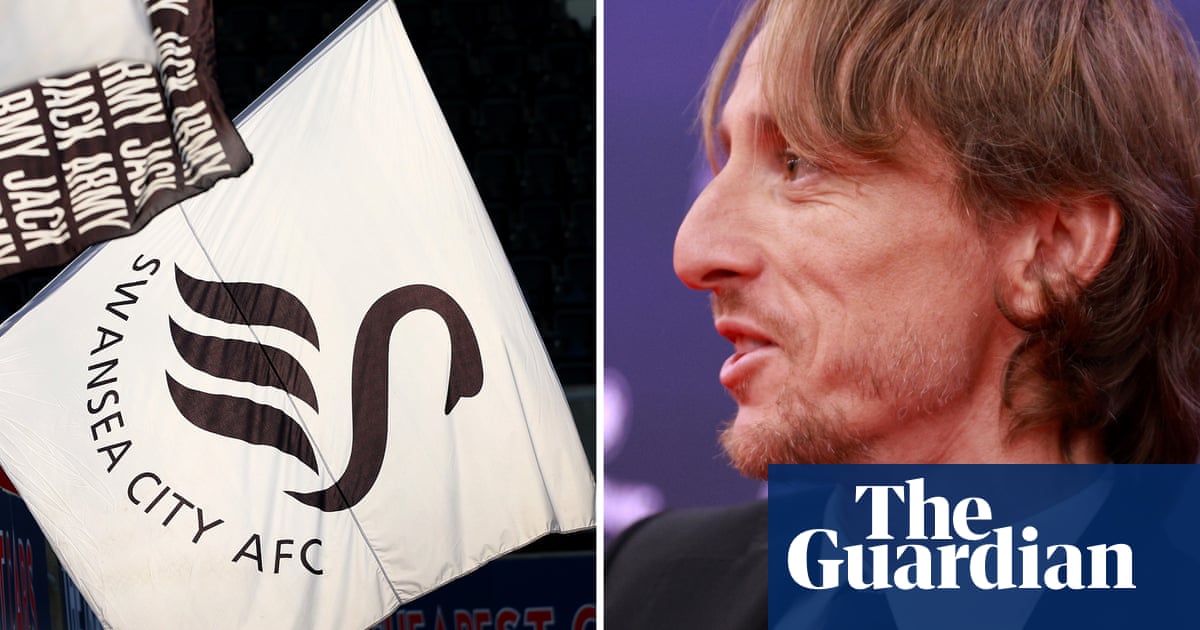It was the transfer nobody saw coming:Luka Modric to Swansea City, not joining as a player but a minority stakeholder. The most decorated player in Real Madrid’s history, a six-time Champions League winner and one of the greatest midfielders of his generation pitching up as a co-owner at a mid-table Championship club was certainly an unforeseen end-of-season development. A Ballon d’Or winner and Bernabéu star walking into the Swansea boardroom or exploring the Mumbles?
The sight of Modric cradling a Swansea-branded football in the accompanying press release prompted a few double-takes and sent a jolt across the game. “Hi Swansea fans, I’mLuka Modricand I’m excited to be part of the journey,” came his message. The 39-year-old Croatia captain may be in the twilight of his career but Swansea hope those words mark just the start of his involvement. “My goal is to support the club’s growth in a positive way and to help to build an exciting future.”
Swansea’s US-based owners put the feelers out with the aim of adding a high-profile investor and Modric, via his long-term agent, Borja Couce, made clear it was an opportunity he was keen to pursue as he began to think about retirement. For Swansea, it was a no-brainer before even thinking about tapping into his knowledge and commercial pulling power. Conversations ramped up before Christmas after Brett Cravatt, one of Swansea’s controlling owners who is based in Los Angeles, met Modric’s adviser via a mutual contact.
Swansea’s hierarchy have been to Madrid to meet Modric and his team, and Couce attended Swansea’s victory over Middlesbrough in March and spent a couple of days in south Wales, shown around the Fairwood training base and the surrounding area by the director of football, Richard Montague, and chief executive, Tom Gorringe. The deal was agreed long before it was announced this month, with all parties mindful of timing. Modric’s shareholding has not been disclosed but it is understood to be similar to the seven-time Super Bowl champion Tom Brady’s 3.3% stake at Birmingham City, who Swansea will face in the second tier next season.
Modric was taken by the idea of pushing Swansea forward. He has an awareness of the club from his time in the Premier League – he twice played against Swansea for Tottenham in 2011-12 – and an understanding of the club’s identity. He has been staying abreast of recent Swansea matches, tuning into games and even discussing the strength of the opposition. Madrid’s next match is against Celta Vigo on Sunday, giving Modric scope to watch Swansea’s final game of the season, Saturday’s meeting with Oxford. The fact Modric played with the long-serving Swansea defender Kyle Naughton at Spurs had no bearing.
For now, not very. Modric’s immediate priority is on finishing the season with Madrid, a fifth La Liga title and a 29th trophy with the club in his sights. He is out of contract this summer but could sign another 12-month extension, as he has in recent years, to take him past his 40th birthday and regardless his intention is carry on playing at least until the 2026 World Cup. Modric is not one for the limelight and he and Swansea want to remain respectful to Madrid.
He is, however, keen to open his eyes and ears to the business of the game, already taking an interest in the operation of the club, including revenues and strategy. Swansea have shared detailed numbers in terms of their business model and structure. Perhaps most significantly he has volunteered to have conversations with potential Swansea signings – a useful sales pitch this summer?
Sign up toFootball Daily
Kick off your evenings with the Guardian's take on the world of football
after newsletter promotion
There is naturally a keenness from everybody of a Swansea persuasion to see Modric in south Wales. At some point in the next few months he is expected to visit but the ownership’s first priority is finalising their next head coach. Swansea have spoken to several candidates about succeeding Luke Williams but in recent weeks have pressed ahead with plans to give the caretaker manager, Alan Sheehan, who joined as an assistant to Michael Duff two years ago, the role on a permanent basis. The 38-year-old former Luton midfielder, who has won five of his seven matches in interim charge this season, expects talks on a long-term contract to conclude this week. Modric’s investment means he and his kids are kitted out with Swansea shirts.
The words of Cristiano Ronaldo, Modric’s former Madrid teammate, spring to mind: “If I can be a club owner, why would I be a manager, sporting director or CEO?” Kylian Mbappé, a current teammate, bought 80% of Ligue 2 club Caen last year, and David Beckham (Inter Miami), Didier Drogba (Phoenix Rising), Paolo Maldini (Miami FC) and Gary Neville (Salford City) are among the former high-profile players to have acquired stakes in clubs.
Modric’s first step into football ownership feels closer to Brady’s involvement at Birmingham or the Hollywood actor Michael B Jordan’s association with Bournemouth. Jordan’s presence as a minority owner is a key marketing driver – he designed a special-edition kit last year. News of Modric’s involvement with Swansea caused an instant rise in followers on the club’s social media channels and the commercial pluses of a deal of this kind cannot be overlooked. For example, Modric has 37.2m Instagram followers, more than most Premier League clubs.
